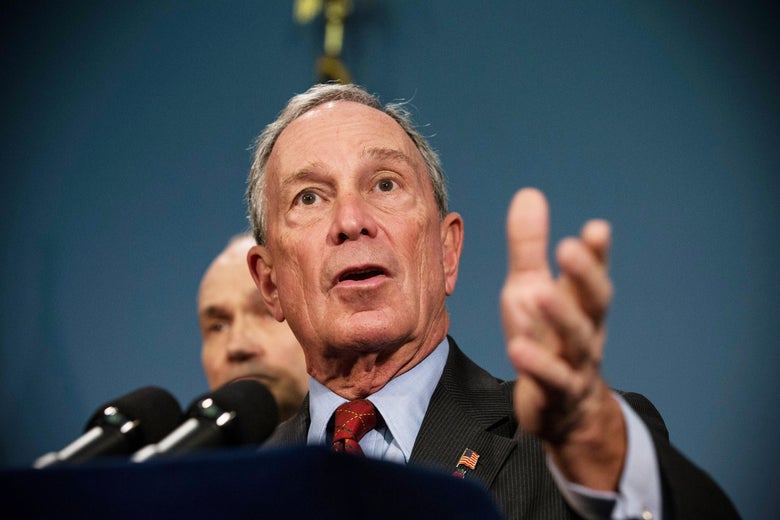
Michael Bloomberg addresses the NYPD’s Stop-and-Frisk practice on Aug. 12, 2013 in New York City.
Andrew Burton/Getty Images
Given his history, registered Republican-turned-Independent-turned-Democrat Michael Bloomberg was always going to have to work to convince Democrats he was one of them. On Monday night, recently surfaced 2015 audio from Bloomberg’s Aspen Institute remarks on controversial “stop-and-frisk” policing in 2015 show why.
Bloomberg:
Ninety-five percent of murders- murderers and murder victims fit one M.O. You can just take the description, Xerox it, and pass it out to all the cops. They are male, minorities, 16-25. That’s true in New York, that’s true in virtually every city (inaudible). And that’s where the real crime is. You’ve got to get the guns out of the hands of people that are getting killed. So you want to spend the money on a lot of cops in the streets. Put those cops where the crime is, which means in minority neighborhoods.
So one of the unintended consequences is people say, ‘Oh my God, you are arresting kids for marijuana that are all minorities.’ Yes, that’s true. Why? Because we put all the cops in minority neighborhoods. Yes, that’s true. Why do we do it? Because that’s where all the crime is. And the way you get the guns out of the kids’ hands is to throw them up against the wall and frisk them… And then they start… ‘Oh I don’t want to get caught.’ So they don’t bring the gun. They still have a gun, but they leave it at home.
Those comments were apparently controversial enough in real time, the Aspen Times reported in 2015, that Bloomberg requested that video of the event not be made public. “We basically honor the wishes of our speakers, and Mayor Bloomberg preferred that we not use the video for broadcast,” the Institute’s chief external affairs officer told the Aspen Times. “He did not give a reason nor did we have any reason to ask for one. We often feature speakers who prefer that their presentations not be videotaped.” It was a line of argument that Bloomberg made repeatedly however, digging himself into a theoretical vortex that somehow resulted in this 2013 radio interview.
Here’s the text of that portion of the interview:
One newspaper and one news service, they just keep saying ‘oh it’s a disproportionate percentage of a particular ethnic group.’ That may be, but it’s not a disproportionate percentage of those who witnesses and victims describe as committing the [crime]. In that case, incidentally, I think we disproportionately stop whites too much and minorities too little. It’s exactly the reverse of what they’re saying. I don’t know where they went to school, but they certainly didn’t take a math course. Or a logic course.
The techniques and strategies used during Michael Bloomberg’s tenure at New York City mayor were a known vulnerability in his new life as a Democratic presidential candidate. During his 12 years as mayor, Bloomberg advocated for the city’s stop-and-frisk policy that gave police officers wide latitude to aggressively police stop and search anyone vaguely suspected of a crime. There was even an official “furtive movements” category for reason of arrest. As a result, New York City police piled into minority neighborhoods making millions of stops targeting black and brown young men in the name of deterrence. In 2013, a federal judge ruled the tactics a violation of the constitutional rights of largely minority communities. Bloomberg stood by stop-and-frisk even as it was phased out at the end of his term and then undone under his successor.
The racial disparity at the height of the stop and frisk era, which began under then-Mayor Rudy Giuliani, is startling. “Of 575,000 stops conducted in 2009, black and Latino people were nine times as likely as white people to be targeted by the police (even though, once stopped, they were no more likely to actually be arrested),” according to the New York Times. “In 2011, police officers made about 685,000 stops; 87 percent of those stopped were black or Latino.”
As a Democratic presidential candidate, Bloomberg has made a U-turn after years of defending his approach even after the courts ruled it unconstitutional. “I was wrong,” Bloomberg said in November before getting into the presidential race. “And I am sorry.” Whether that’s enough to convince minority voters remains to be seen. “Over time, I’ve come to understand something that I long struggled to admit to myself: I got something important wrong,” Bloomberg said. “I got something important really wrong. I didn’t understand back then the full impact that stops were having on the black and Latino communities. I was totally focused on saving lives, but as we know, good intentions aren’t good enough.”
from Slate Magazine https://ift.tt/2OLLnR2
via IFTTT
沒有留言:
張貼留言